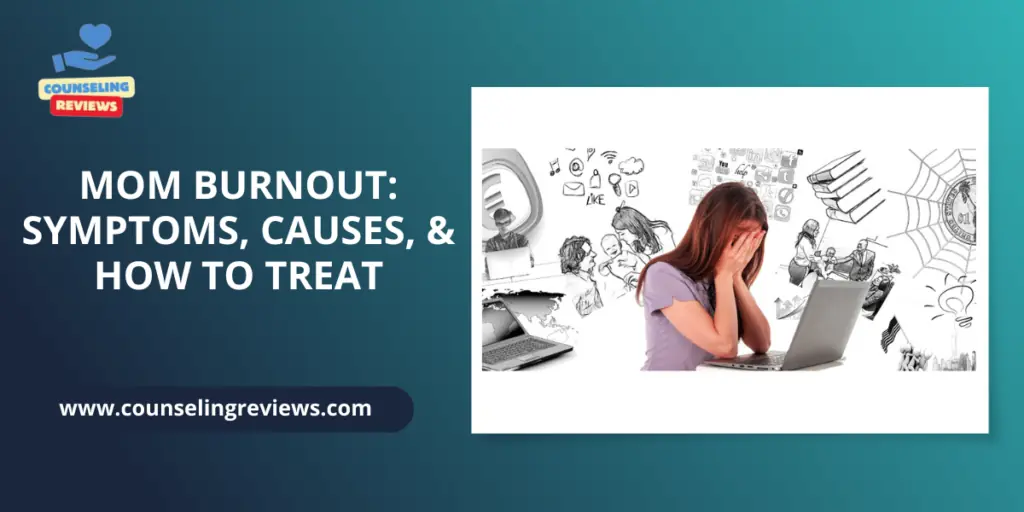Mom burnout can be defined as feeling exhausted in many ways, including physically, mentally, and emotionally, from being a parent or caregiver to children. The demands of motherhood can be taxing when your little ones depend on you for everything. From feeding to bathing, scheduling appointments, and getting them out of the house on time, it takes a lot of effort and focus to be a parent. Many women experience mom burnout from doing parenting tasks day in and day out. If you feel like this, you are not alone!

Which are the Signs and Triggers of Mom Burnout
Signs and triggers of mom burnout may look different for each individual. We all experience stress, tiredness, and our emotions in different ways, so it is okay if you are noticing some or all of these signs of burnout. Below are some of the common symptoms of burnout:
- Exhaustion: Feeling tired may be a natural part of being a human and better yet, being a parent, but when it turns into utter exhaustion, you may be experiencing burnout. Exhaustion can lead to a lack of sleep, poor physical health, and mental fatigue. Keeping track of how much you’re sleeping and how rested you feel is a good way to determine if you’re starting to get burnt out.
- Changes in Self-Care: Another common symptom of mom burnout is changes in your own self-care. If you are so focused on children and forgetting your basic needs, it may be time to consider how you’re truly feeling. Changes in your self-care such as not showering as often, not taking care of your hair and teeth, wearing the same clothes multiple days in a row, forgetting to eat, and more can lead to more detrimental effects in the long run.
- Irritability: We all know that managing chaos and being a parent can make us feel
irritated at times. But when you’re irritated over everything and you find yourself
snapping at others or shutting down, it is time to recognize that you may be burnt out. Fluctuations in mood are normal based on various events, however, burnout can make those mood shifts intense and more frequent. - Feeling Like a Failure: Unfortunately being a parent and experiencing mom burnout can make you feel mom guilt and like a failure. Even with all of the effort you put into raising children and maintaining a home, if you still find yourself feeling like you’re not good enough you are probably going through some mom burnout. This is where a positive support system will be key…to help boost your spirits and remind you that you are doing a fantastic job!
- Overwhelmed: Similar to feeling like a failure, a sign of burnout can be feeling
overwhelmed with daily tasks. While taking care of others is a big task in itself,
constantly feeling overwhelmed with things that are little is a symptom of mom burnout

In addition to noticing the signs of burnout, it is also important to identify what in particular is triggering those feelings. Again, each mom will have different triggers, as we all experience parenthood differently and come from different situations. To identify what is triggering your mom burnout, try journaling or making notes of what is going on when you experience moments of irritability, overwhelming feelings, or utter exhaustion. You may notice some themes on what is causing your burnout, and then you can work to cope with it.
What does Mom Burnout feel like?
Have you ever experienced the feeling where nothing seems to be going right, you can’t catch your breath, and the stress keeps piling on? This is just one of the ways that mom burnout can feel. Maybe your experience with burnout causes you to feel on edge or irked all the time, and maybe you even don’t feel like yourself because of how stressed and tired you are. Whichever way your burnout presents itself, it can be a normal part of motherhood.
What Causes Mom Burnout
Motherhood and parenting are stressful and chaotic. There are many things to manage when taking care of a child or multiple children, and putting everyone else’s needs before your own can lead to burnout. Many new moms feel they have to take on everything by themselves and unfortunately then push themselves to the limit to accomplish everything.
Similar to stress and work burnout, mom burnout is caused by doing too much and not taking care of yourself. When moms are only focused on their children and family, they often neglect themselves which can lead to the symptoms discussed above. Moms may think they have to do everything alone and always be there for their child, but the reality is a burnout mom cannot provide the same level of care she can when she is energized and well.

How to Cope with Mom Burnout(Tips to Manage Burnout)
Now that you’ve realized you may be dealing with mom burnout, let’s talk about how to manage it. Feeling exhausted can lead to a lack of motivation to do anything extra, but it is important to start working on coping and managing the burnout so you can recover. Anything that is relaxing is a coping strategy! Whether that is reading a good book, drinking a glass of wine, taking a long bath, or having quiet time to yourself, these moments give you a chance to reset, recharge, and get back on your feet.
A lot of women find it useful to have a support system of other moms they can rely on. Sharing stories, venting, and receiving validation from others in similar situations can help to reduce some of the emotional frustration you may be feeling. After all, they do say it takes a village!
Recovering from Mom Burnout – Therapy Options
Sometimes changing your self-care routine and talking to other moms and parents may not be enough. You may still be dealing with some of those nasty thoughts of failure or overwhelming feelings. When trying to cope and recover on your own doesn’t work completely, it is okay to reach out for help from a trained professional. Many mental health clinicians specialize in working with mothers postpartum who are struggling with burnout, postpartum depression, and postpartum anxiety.
These professionals can help you process and make sense of some of your
thoughts, while also providing you with validation and support in a nonjudgmental way. There are many options for therapy these days, so you should be able to find professional help that fits your budget and your schedule. Here are some of the ways you can find therapy options for you:
● Therapist Directories – In addition to the general internet, there are specific therapist website directories that can point you in the right direction. Some even help you find therapists who accept your insurance and specialize in maternal mental health.
● In-Person Sessions – Meeting with a therapist or counselor in person can provide a safe and cozy space for you to talk things through. A lot of people enjoy this option, as it gives them time to themselves away from the hectic day-to-day schedules that mothers usually have.
● Telehealth Sessions – For individuals who prefer to meet someone from the comfort of their own home, virtual therapy sessions are also an option. Since the pandemic, many therapists have transitioned to only offering telehealth care. This option allows you to still meet with someone without having to factor in drive time to an already busy schedule.
● Support Groups – Another option for mental health help with motherhood are support groups. These groups offer peer support from other moms going through similar situations and are facilitated by a trained professional.
How to avoid burnout in the future
Avoiding future burnout starts with increasing awareness of your thoughts, feelings, and responses. Once we begin to recognize our triggers for certain things, it is much easier to take a step back and change how we react. Keeping a regular self-care schedule and routine, and planning time for yourself are key components to avoiding burnout in the future.
Reaching out for support from family, friends, and other mothers is also a great way to find relief and prevent yourself from getting overwhelmed with the challenges of being a mom.
Conclusion
Hopefully, this article makes you feel like you are not alone in your feelings. Many many women experience mom guilt and mom burnout due to the intense job parenting is. If you’re starting to recognize signs of burnout in yourself or your friends, it is okay to take time out to recover and
de-stress. If working on your burnout yourself doesn’t seem to be enough, there is no shame in reaching out for support from a mental health professional. Moms are incredible beings and it’s okay to take time to reward and thank yourself for all that you do.





